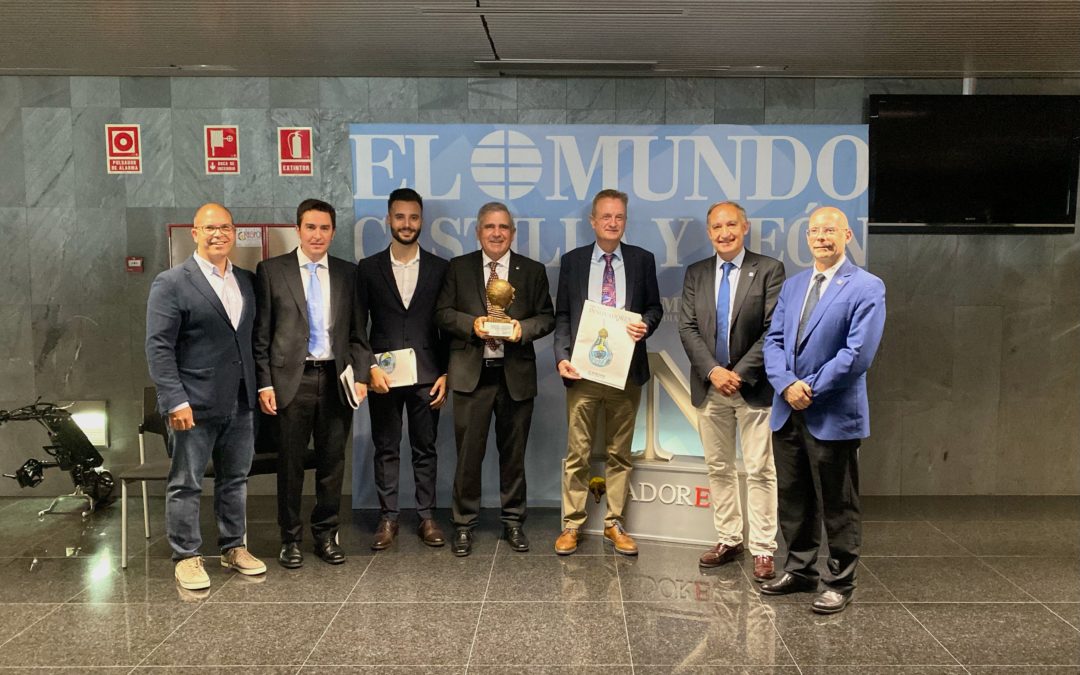Pablo Lago, editor for the Diario de Castilla y León, gave away yesterday to the thirteen winners of the Innovators 2022 Awards at the Business Solutions Centre in Arroyo de la Encomienda, including CARTIF and the and the University of Valladolid with the Iberdrola Award for Best University Research Project for their initiative of sensors for elderly people’s homes designed to guarantee their safety.
An afternoon in which talent and research formed the perfect tandem, the CARTIF health team and researchers from the University of Valladolid proudly celebrate the recognition of their study and development of a system capable of recognising in real time the most common activities in the daily lives of the elderly to monitor their habits or problems in order to extend their independence for longer.
Castilla y León is one of the autonomous communities in which the active ageing of is population is one of the majors problems to be addressed among its citizens. Thanks to this system, doctors and therapist will be able to know the habits that an elderly person has in their day-to-day life and can check that they are correctly taking their medication at the right times, for example, or find out about any type of eating disorder if they are not eating their daily meals properly. The device is of great benefit to many elderly people, especially those suffering from neurodegenerative diseases such as Parkinson’s or Alzheimer’s.
Without any intrusion into the personal lives of the users using this system, the sensors are simply designed to monitor everyday events that occur within the user’ home, such as the opening of doors or cupboards, detection of movement in the corridor, or variations within the kitchen to ensure the safety of the elderly.
Sensorised houses
This system proposed by CARTIF and University of Valladolid researchers has a total of 33 sensors distributed among different areas: 28 motion sensors, 3 door sensors and 2 temperature sensors. It is configured to record a series of data each time a sensor detects a change in its state or a measurable value such as the time the event was generated, the sensor what was affected, the new state of the sensor and the start or end of an activity. The purpose of this configurations is to reveal whether parallel or unusual activities are taking place in the home of a person living alone.
In the device, the use of passive infrared sensors allows the area of the house occupied by a user to be known. These are easy to install immune to pets and have low power consumption. On the other hand, contact switches are used to detect activities such as leaving the house, opening the fridge or cupboards. Finally, temperature sensors are used to detect activities such as cooking or showering.
The future of sensorised houses
The research team is currently creating its own database, collecting information on a wider range of activities, as the one used in this study does not capture some of the more frequent, everyday activities. Another challenge they face is to monitor multi-person dwellings.
Innotaros 2022 Awards
The Innovadores 2022 Awards gala of the El Mundo de Castilla y León supplement, one of the most veteran publications on research and innovation in the Spanish press, brought together leading professionals from the research and innovation sector from all over the autonomous community, thus recognising the region’s talent in the field of science.
Carlos Fernández Carriedo, Minister of Economy and Finance of the Junta de Castilla y León, was in charge of presiding over the event and presenting the award for the Unique Person of 2022 to Felipe Romera Lubias from Soria for being a key player in the creation of a technological innovation ecosystem in Malaga-
In addiction to this honorary recognition, thirteen other awards were presented: IBIOMED and CAULE for Project of the Year, BBMiradas for Iberabal Best ICT Project, Raúl Martínez Valencia for Caixabank Young Innovator, CARTIF and the University of Valladolid for Iberdrola University Research; in addition to the nine provinces of Castilla y León: Ana Judith Martín de la Fuente for Ávia; Miriam Rodríguez fo Burgos; Sara del Río González for León; Rooteco Atriculture for Palencia; Centro de Investigación del Cáncer for Salamanca; Débora Cerdán for Segovia; Centro de Desarrollo de Energías Renovables for Soria; Tomás Ruiz Albi for Valladolid; and the Food Technology Area of the Viriato Campus for Zamora.

